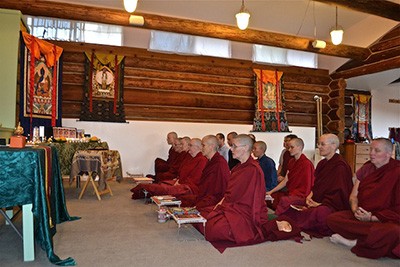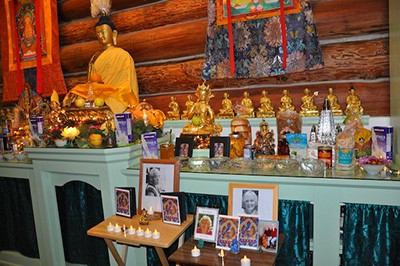Losing a dear one who was young

Letter from Carol
Dear Venerable Thubten Chodron,
Can anybody tell me why … My younger sister passed away due to cancer. She was so healthy before and yet she left us at age 35, before the other siblings who are all older than her. She didn’t do anything wrong, and she said she never made a big mistake or did a big sin. She asked me why she was going to die so young and I didn’t answer because I didn’t know what to say.
Now she is gone and I’m left with the questions she asked and no answer, so I wonder why too. Can anybody there tell me where my sister is now? I miss her so much.
I went to a temple here in Singapore to pray for her before and after she died. It seems that nobody is listening to us and still took her away. She was only 35 years old, and she said she had so much that she wanted to do. For example, she wanted to repay the kindness of our father and mother because they had done so much for us, giving us this life and bringing us up.
Why did God not want to give her a chance? Why am I still here, and why is she no longer here even though I used to get sick more often than her (thankfully not with cancer)?
I wonder why…
Carol
Response from Venerable Thubten Chodron
Dear Carol,
I’m very sorry to hear about your sister’s death. You loved her a lot and miss her. When someone young dies—especially someone who was kind, generous, and much loved like your sister—we are always shocked; it seems so unnatural.
From a Buddhist perspective, we do not believe in a God who created and manages the universe, because then questions such as yours are indeed difficult to answer. Instead, the Buddha explained that what we experience in our lives is influenced by the actions (karma) we did in previous lives. Although we cannot remember those specific actions, which may have been done long ago, the constructive actions still bring us happiness and the harmful ones still ripen in misery. Our present human lives are a combination of happiness and misery because we have done both constructive and destructive actions in past lives.
Although your sister died young, she still had a good life. She shared love with her family, developed her kind heart, and did many constructive actions which will bring her happiness in her future lives. Please rejoice at the time you had with her and all you learned from each other and send her on to her future life with a lot of love. Please read the King of Prayers as often as you can and dedicate this constructive deed for her benefit.
If you send me her name, the monastic community at Sravasti Abbey will make prayers for her well-being and for yours as well.
Sincerely,
Venerable Thubten Chodron
Additional message to readers
Dear Readers,
Had the situation been slightly different—let’s say the writer was someone who was familiar with Buddhist tenets and who lost a dear one suddenly—I would add the following in my response:
It’s always a shock when someone dies suddenly and unexpectedly, especially when it’s someone we cherish. As you’re processing your grief, remember that all things are impermanent, that everything that comes together must separate. This is a natural law; it’s the way things are. Use this understanding to spur your own Dharma practice. Use it also to develop compassion not only for the deceased, but for all sentient beings, including yourself, who abide in samsara. Contemplate that undergoing loss is a strong reason why it’s important to practice the Dharma in order to attain liberation from cyclic existence and to help all beings attain enlightenment as well. By using your dear one’s death to spur your determination to be free, compassion, and altruism, you are making the person’s death meaningful in terms of eliminating the suffering of sentient beings.
Making offerings to temples, monasteries, and charities for the poor and ill will create merit that you can dedicate for your dear one’s good rebirth, liberation, and enlightenment. Reading the King of Prayers , meditating on compassion and bodhicitta, or meditating on Medicine Buddha or Kuan Yin (Chenrezig) are also very beneficial. In that case, imagine Medicine Buddha or Kuan Yin on the person’s head. Light pours from that Buddha into the person’s body-mind, purifying all negativities and obscurations. Then dedicate that they take a precious human life or are born in the pure land. Do such prayers and practices for 49 days after your loved one’s passing. Be sure to send them on to their next life with love and compassion; do not cling to them in any way. Practice the Dharma well so that in future lives, you will be able to benefit them and lead them on the path to enlightenment.
Venerable Thubten Chodron
Venerable Chodron emphasizes the practical application of Buddha’s teachings in our daily lives and is especially skilled at explaining them in ways easily understood and practiced by Westerners. She is well known for her warm, humorous, and lucid teachings. She was ordained as a Buddhist nun in 1977 by Kyabje Ling Rinpoche in Dharamsala, India, and in 1986 she received bhikshuni (full) ordination in Taiwan. Read her full bio.


